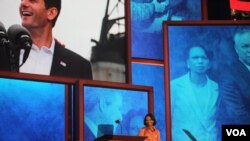Following days of speeches by party heavyweights, Mitt Romney is set to take the stage Thursday evening at the Republican National Convention, making his case for the United States presidential race.
The republican party nominee will address those at the convention in Tampa, Florida, after days of speeches by party members aimed at showing their candidate's edge over US President Barack Obama.
Republican vice presidential nominee Paul Ryan gave a strongly worded speech Wednesday night, promising an end to "excuses and idle words" when it comes to the economy if voters choose Mr. Romney in the November election.
Condoleezza Rice, who also graced the convention, never addressed President Obama by name, but the former Secretary of State delivered a sharp rejection of his foreign policy Wednesday evening, charging that the White House had forsaken past and potential allies, leaving the world to wonder, "where does America stand?"
Her speech did not stop at the shoreline as she touched on domestic issues, lines that won her some of her evening's most raucous applause.
"It has been hard to muster the resources to support fledgling democracies or help the world's most desperate, the AIDS orphan in Uganda, the refugee fleeing Zimbabwe, the young woman who has been trafficked into the sex trade in Southeast Asia; the world’s poorest in Haiti," said Rice "
"And I know too that there is weariness – a sense that we have carried these burdens long enough. But if we are not inspired to lead again, one of two things will happen – no one will lead and that will foster chaos —- or others who do not share our values will fill the vacuum ..."
Some Zimbabweans based at home and abroad believe that such United States political processes play a crucial role in deepening democracy in developed nations. They argue that Zimbabweans may in the long run benefit from such conventions.
For perspective on the on-going Republican convention and related democratic processes, VOA spoke to Jeffrey Smith, Africa advocacy officer at the Robert F. Kennedy Center for Justice and Human Rights, and Professor Stanford Mukasa of the Indiana University of Pennsylvania.
Mukasa said Zimbabweans must respect such democratic processes.
"There is one very important fundamental lesson Zimbabwe must learn, that is to obey, follow and establish such processes," said Mukasa, adding that "look at what happened in 2008 in Zimbabwe where the opposition won the elections and (President Robert) Mugabe refused to step down."
Smith echoed Mukasa's sentiments saying the political environment must be condusive for the country to have such democratic processes in order to hold free and fair elections.
The republican party nominee will address those at the convention in Tampa, Florida, after days of speeches by party members aimed at showing their candidate's edge over US President Barack Obama.
Republican vice presidential nominee Paul Ryan gave a strongly worded speech Wednesday night, promising an end to "excuses and idle words" when it comes to the economy if voters choose Mr. Romney in the November election.
Condoleezza Rice, who also graced the convention, never addressed President Obama by name, but the former Secretary of State delivered a sharp rejection of his foreign policy Wednesday evening, charging that the White House had forsaken past and potential allies, leaving the world to wonder, "where does America stand?"
Her speech did not stop at the shoreline as she touched on domestic issues, lines that won her some of her evening's most raucous applause.
"It has been hard to muster the resources to support fledgling democracies or help the world's most desperate, the AIDS orphan in Uganda, the refugee fleeing Zimbabwe, the young woman who has been trafficked into the sex trade in Southeast Asia; the world’s poorest in Haiti," said Rice "
"And I know too that there is weariness – a sense that we have carried these burdens long enough. But if we are not inspired to lead again, one of two things will happen – no one will lead and that will foster chaos —- or others who do not share our values will fill the vacuum ..."
Some Zimbabweans based at home and abroad believe that such United States political processes play a crucial role in deepening democracy in developed nations. They argue that Zimbabweans may in the long run benefit from such conventions.
For perspective on the on-going Republican convention and related democratic processes, VOA spoke to Jeffrey Smith, Africa advocacy officer at the Robert F. Kennedy Center for Justice and Human Rights, and Professor Stanford Mukasa of the Indiana University of Pennsylvania.
Mukasa said Zimbabweans must respect such democratic processes.
"There is one very important fundamental lesson Zimbabwe must learn, that is to obey, follow and establish such processes," said Mukasa, adding that "look at what happened in 2008 in Zimbabwe where the opposition won the elections and (President Robert) Mugabe refused to step down."
Smith echoed Mukasa's sentiments saying the political environment must be condusive for the country to have such democratic processes in order to hold free and fair elections.









